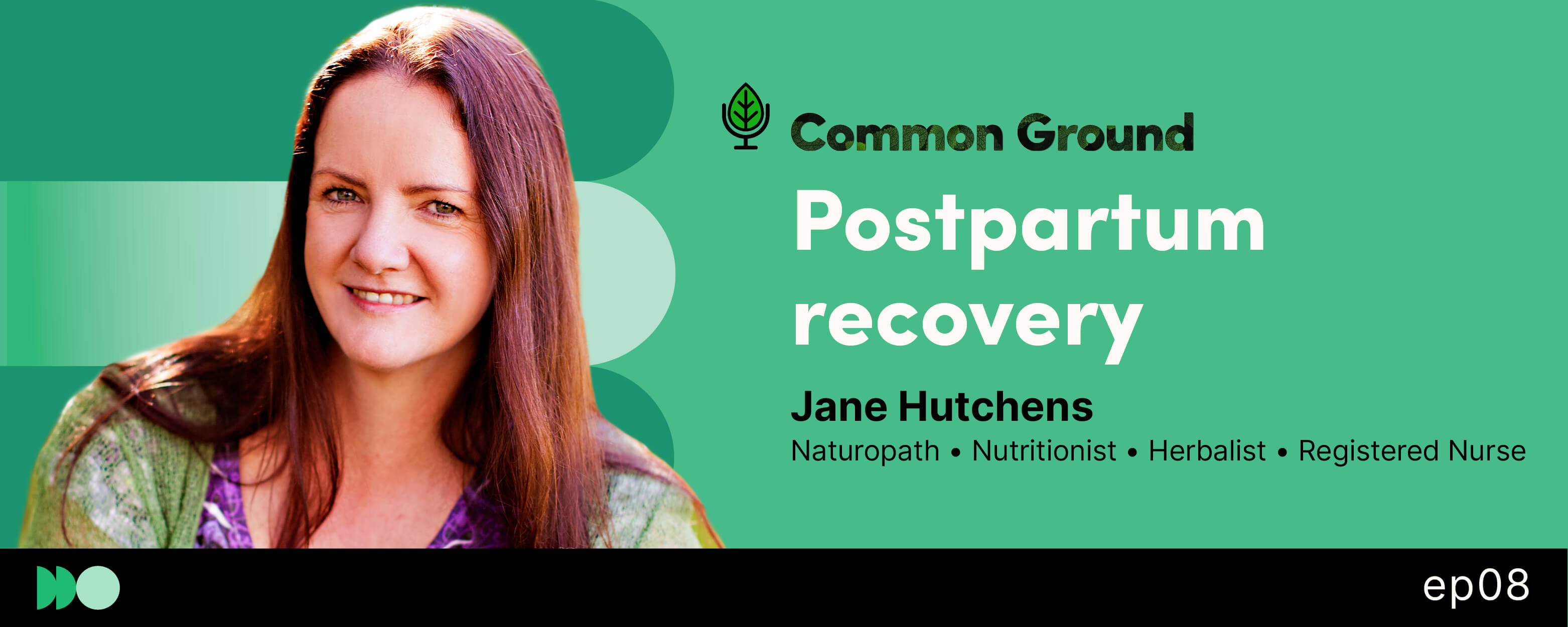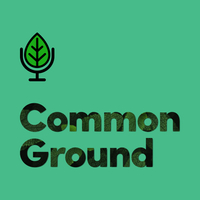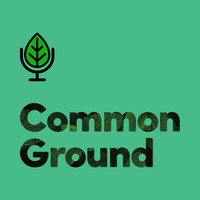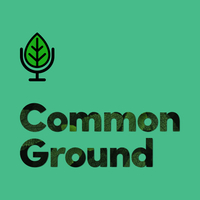
Listen on Amazon music | Apple Podcasts | Google Podcast| Spotify
Transcript
Wendy McLean (00:04):
Welcome to Common Ground, a podcast series discussing new research and interesting projects in the field of complementary medicine. Hello, my name is Wendy McLean educator at vital.ly.
Vital.ly is a digital platform, a professional health resource and a distribution service all in one. We specialise in complimentary medicines and distribute high quality products from our base in Mascot, Sydney.
The process of giving birth and breastfeeding combined with the stresses and strain of modern parenthood can lead to chronic and debilitating fatigue and physical and mental deterioration in new mothers, a condition that has been termed postpartum depletion. In addition up to 80% of women can suffer from postpartum blues while adjusting to the demands of new motherhood, and up to 20% of women suffer from more severe depressive symptoms, that is from postpartum depression. If left unchecked, both of these conditions can lead to long-term health consequences and significantly impact a woman's quality of life.
Today on Common Ground, I am joined by Jane Hutchens to take us through the pressures and issues facing new mothers and how we can differentiate between postpartum depletion and depression from normal fatigue. Jane discusses key nutrients for recovery, as well as dietary and lifestyle interventions that enhance long-term wellbeing.
Jane has over 30 years’ experience in healthcare as a registered nurse and naturopath, and now as a public health PhD candidate researching cardiac disease in pregnancy and postpartum. Her work has largely been in reproductive health in gynecology, gyno-oncology, family planning, and her own naturopathic practice. In addition to her clinical practice, Jane has written chapters in textbooks and lectured and developed course material in both nursing and complementary health.
Welcome Jane. It's great to have you join us on Common Ground.
Jane Hutchens (02:04):
Thanks Wendy. It's excellent to be here.
Wendy McLean (02:08):
Jane, new mothers have so many demands put on them, both physically and emotionally, and you know, they're tired. Fatigue is very common, but how can we tell the difference between what is just being a normal tired, and what is actually something more debilitating and serious? So chronic depletion.
Jane Hutchens (02:28):
Yeah, I think the key thing as always is to start with a really good thorough assessment. So that includes at the centre a really good history. So you want to know what she was like before she was pregnant? Was she always being tired? Did she just have a really low energy level or she got something else simmering? What was she like during pregnancy? How long has this been going? Are there times when she's not tired, all of that sort of stuff. And then looking to make sure she's not anaemic or she doesn't have Hashimoto’s or something else that's underlying. So really it is just getting the details. Has she slept this year? That sort of stuff. Is it a, is it an understandable fatigue that is normal postpartum because you've, you've had compromised sleep and everything else, or is it something a bit more leaning towards pathological?
Wendy McLean (03:22):
Yeah. I imagine the iron is a big one, as you mentioned, and anaemia and whether they had it before pregnancy, during pregnancy and obviously then reassessing in the postpartum as well. So what are the factors that can contribute? You've mentioned some, to this postnatal depletion. You've touched on things like thyroid. Are there any others?
Jane Hutchens (03:44):
There's a heap. So even, even, you know, we, we speak so much in complementary medicine about preconception care and increasingly in Orthodox medicine and it starts back there. So how well she was and her husband or partner or sperm donor was before conception affects her pregnancy as well as the infant and her postpartum recovery. So you also want to look at nutrition during pregnancy. I spoke to someone the other day, who's on her fourth pregnancy now. So far she's okay. But the first three, she had to go to hospital multiple times with hyperemesis gravidarum*. I have no idea how she's still standing. When I did her bloods, an assessment just as a basic routine preconception, she had nothing of anything. I just don’t know how she functioned at all. So yeah, nutrition, as you say, anaemia can be chronic long standing. It blows my mind that so many people aren't assessed even at their six-week postpartum checks. Just check their iron.
Wendy McLean (04:47):
So Jane, are there any long-term health effects from this postpartum depletion?
Jane Hutchens (04:53):
So I guess it really important thing to, to highlight is that this depletion is on a spectrum, so it could be kind of mild and almost self-limiting to really severe. And so if you do have long-term consequences of it, it's related to how severe it was, and how long you had it before you got intervention. So the earlier we get in and by that, I mean by preconception, but definitely the earlier we get in will help. So you will have an increased chance of it kind of tipping over into a full-blown depression, it's self-identity and mood and self-esteem issues, all of the issues with long-term nutrient depletion, if you haven't repleted. So she might have chronic anaemia, a chronic zinc deficiency and mood disorders and so forth. But if a woman is not functioning well, my first priority is her.
So it's all of the impacts on her, but then there are impacts on her experience of mothering. So she may not feel able to do it as well or enjoy it as well. And then that impacts on her child, impacts on her relationship, her family. She'll have a reduced ability to, to, to work if that's what she chooses to do. So there'll be family income issues, but just generally as an economy and as a society, she won’t be able to engage fully. And also if we don't replete, then her return to kind of some sort of hormonal function is much more compromised. So she may take ages to get back to normal ovulation when she finishes breastfeeding and she may have impaired fertility next time around because she's just running on empty.
Wendy McLean (06:35):
Yeah. And I've certainly heard of cases where, you know, even women approaching menopausal age saying I've never been well since my first birth or second birth.
Jane Hutchens (06:48):
Definitely. And, and menopause kind of flares it. So everything that was imbalanced just goes on steroids in menopause. And I think, I think that's the thing. It's that balance between normalising and working out that it's not normal. So it's normal to be tired and it's normal that your life has changed, but if you still feel really bad, three years later, we've got a problem. So we, we just accept so much…That I'm a busy mom and blah, blah, but we just need to give people permission to say no, no, no, no, this is too much. And we need to also remember that postpartum is for life. So the purpureum or perinatal period is considered to be six weeks, but you know, that's rubbish. And even in, in psychiatry, they recognise it's a minimum of a year, if not longer. And, but reality is that it's lifelong. So your, your cardiac health during pregnancy affects your midlife cardiac health, whether you breastfeed and so forth.
Wendy McLean (07:59):
Yeah, yeah, definitely. And that brings me to the next point, which you've touched on, which is the depression. So you know, a lot of women suffer from postpartum depression, but sometimes that can manifest years later as well. So how, how do you tell the difference between just depletion, repletion, and postnatal depression?
Jane Hutchens (08:22):
It can be really tricky. And again, it comes down to a good history, but I think one of the key differences are, if you want to shortcut it, is when you depleted and you feel like you've been hit by a bus and, oh, it's so hard you can have a decent, if you lucky, you can have a decent sleep, even if it's for four hours or a rest or a good meal or a massage and think, oh, I feel so much better. Even if that only lasts for half an hour. When you have full depression, you don't ever have that feeling. So you can sleep for eight hours and wake up and still feel completely dead. And the key feature of depression is anhedonia* where you, you, you don't find enjoyment in anything, but particularly in the things that you used to find enjoyment in. And I think that's the kind of difference.
And women with depletion don't doubt their ability or their safety with their child. One of the key things with postpartum depression is that “take my baby”. I don't, I'm not trustworthy to look after him or her, or I'm fearful that I'm going to do something to them. And that's major. So there's the DSM five criteria, which gives you, you know, you have to tick all those boxes to get a formal diagnosis. You can use the Edinburgh depression scale, or if you've got two seconds, just tease that out about, do you ever feel good?
Wendy McLean (09:56):
Yeah. I think that's, that's quite a clear distinction.
Jane Hutchens (10:00):
Yeah. And it's hard. It's a hard time.
Wendy McLean (10:05):
Yeah. Yeah. And so you've touched on a few of the factors that contribute to the postnatal depression. So I guess it's a vicious cycle, isn't it? It's a lack of sleep. It's a lack of nutrients. And, and these changing hormones.
Jane Hutchens (10:21):
Yeah. Yeah. So it sets you up. So high cortisol will increase your depression. High cortisol is common in depletion and pregnancy. Like, it's just how it is. You know, a minimum of 4% of women will have postpartum thyroiditis, which in their first six months presents us underactive thyroid, which makes you feel and look depressed. So you just have to tease all of these out and you can absolutely have more than one thing at a time. When you have an unwell baby, you know, if you spend three hours a day driving to and from the NICU* to deliver the milk you have pumped overnight and your baby has been there for three months. Like, is it postpartum depression or life depression? A lack of social and family support, poor health, preexisting mental health conditions, whatever they are. So the other thing to remember is that more recent research has shown that perinatal anxiety is probably just a little bit more prevalent than depression. So we have to make sure we include that, as well as PTSD. So about 30% of women talk about birth trauma. And that's a lot of women and women with severe maternal morbidity, women who had to go to intensive care and their babies went somewhere else. So you have to deal with, with all of that stuff. In a woman's life, the time that she's most vulnerable to the domestic violence is in her first pregnancy, with that partner. Yes. So there may have been with that partner for five years, but in her first pregnancy is when she's most at risk for being beaten up for the first time. And it's very hard to disclose. So she may have had no support around that. For women with a history of sexual assault giving birth it is really frightening. You have no control and you have every man and his dog in your space and telling you what to do and all of that stuff. So just having a mindfulness around that and knowing who you can refer to. Yeah, there's a lot of things.
Wendy McLean (12:40):
There are a lot of things and I do feel that the PTSD is probably something that is overlooked. It's not something you know, that you necessarily hear about. But I certainly do know people that have had traumatic birth and, and have experienced PTSD and, and overlapping depression. So yeah, it's a real issue.
Jane Hutchens (13:06):
One of the things that happens as well is that you say, well, you've got this healthy baby. It was all worth it. You know, I've just gone through major trauma. We just dismiss her concerns all of the time. It's, it's a lifelong habit. And it really kicks in when someone's had a trauma. It's not just about well you had, everything's worth it, you've had a healthy baby. A that makes the trauma and the depression complicated and protracted. It lingers for years if it's not supported.
Wendy McLean (13:41):
Yeah, absolutely. So yeah, we really need to know who to refer to and to have these support networks and then know what we can do as CAM practitioners. We can support diet and lifestyle and, and, you know, and help them with the nutrients that they need. So you've mentioned some of these Jane, but what are some of these other key nutrients that, that you need to, to help replete the new mother or also to help address depression?
Jane Hutchens (14:09):
Well, so recognising the role of inflammation. Anything anti-inflammatory. So in your diet, so just know veggies, plain protein, lots of water, and good essential fatty acids. It's kind of pretty basic. But supplement wise certainly essential fatty acids again, and probably with the predominance DHA for the brain inflammation issues because there is that neuroinflammatory aspect. Zinc. We dump a whole lot of zinc in the last few weeks of pregnancy into the baby. So it's very easy for that to become sub-optimal. Magnesium because, you know, because magnesium is so important. It's important for mood, energy, muscle fatigue. Iron, obviously, but also check, like we really need to test people before we supplement. And vitamin D is a really important one. And there's a whole bunch of others, you know, I love withania, nettle, just throwing things in as a tea, instead of necessarily a supplement. We don't want to complicate their lives with this outrageous regime that's going to cost someone 89999mmja motza and just be too hard to remember because, you know, they haven't slept since January. We to make it really doable. So the more you can have a really simplified regime the better, but obviously if they're really critically unwell, you've, you've, you've got to hit them with some stuff.
Wendy McLean (15:41):
Yeah, that's right. But I do, I really like the idea of teas, they're so wholesome and nurturing as well, and give you time to pause, just while you're making it.
Jane Hutchens (15:51):
Absolutely, it's that ritual. And when we said earlier about women having expectations, or society, having expectations that she's just going to bounce back, oh, that expression is awful. We need an expectation where she has gentle restorative rituals, you know, someone sit and wash her feet while she's breastfeeding and massage her feet, you know, just beautiful things like that. And tea and making tea is a fabulous ritual. And using that time of, okay, this is five minutes, this is what I'm going to do in my tea time. Put my feet up against the wall if that's possible. Meditate for two minutes, if that's possible or just look out at the window or pat your dog or whatever.
Wendy McLean (16:39):
Yes. They're all great recommendations that can really help to support the mother. And do, do you have any other recommendations? Do you have anything around say exercise because I know there's a lot of pressure. You see, like these celebrities, you know, bounce back, they're doing their workout regime and you know, six weeks after it's just so unrealistic.
Jane Hutchens (17:03):
Yeah. It's totally unrealistic. And I really encourage everyone to have a pelvic floor assessment before they get back into formal exercise. I think a six-week postpartum women's health, physio assessment is awesome. The first thing I recommend people do is nothing. Do nothing for goodness sakes, stop. Look at some of the other cultures and historically it's like, well, you just lie there for a month. Then we'll go and take care of the baby and cook and feed. So that would be awesome. So we need to encourage nothing and really prioritise rest and sleep, and then start with exercise. And the exercise that you do is the exercise that you like. And that might be that that's the way you like moving your body. That's how you feel good afterwards. And it might be the social thing. So that's where you really enjoy going for a walk around the river with your girlfriend who has a baby or with your mother or going to pilates with a postpartum group. So trying to tick as many boxes as you can when you're doing it. So you're outside, you're getting some exercises. You're seeing your mum, you're getting some vitamin D.
Wendy McLean (18:16):
That good, great, great advice.
Jane Hutchens (18:20):
Yeah. And I think really, it's a great time to prune your social media accounts and delete people who are just making you feel rotten and follow people who are nourishing and nurturing to your wellbeing and setting up some boundaries as well about who you let into your life and into your house and what you'll accept them saying and doing and pressuring.
Wendy McLean (18:51):
Yeah. It's yeah. I think social media definitely has a lot to answer for. That's really tough.
Jane Hutchens:
So you just have to find the good ones. Because there are good ones.
Wendy McLean:
So what are some other resources or support networks that are available for women that are suffering postpartum depression or just this depletion other health issues? Are there are other services?
Jane Hutchens (19:18):
Yeah, there's a whole bunch of stuff. And I guess it depends on the individual woman's needs as well as finances and where she lives. So for instance, where I live, there's a really good network of postpartum food trains. So there's a Facebook group and every day it's like, you know, Mary Lou had a baby, here's the schedule, write down what meal you're dropping off when, and that goes on for months. Yeah. And there's also a free community program, NEST, that there it's a little bit like a doula, but a bit lower level. So you can have someone coming every Tuesday for two hours and they'll do your washing or clean or make you food or whatever it is that you need, basically. You I think a postpartum doula is an awesome, awesome thing in the absence of having someone in your family who can do it.
Wendy McLean (20:16):
Absolutely. Yes.
Jane Hutchens:
So they, they do, they're replacing what used to exist in previous sort of family, social structures, but having someone bring you food, rub your feet. And I've got a bit of a thing about that today. So they debrief, you know, they talk about it. They, they often have their own young children, some of them do extra training on breastfeeding, that sort of thing. So I think that can be really helpful. So family…get really good at asking for help and then accepting help, which is a separate thing altogether. Pay a cleaner, if you can. There are organisations like the Perinatal Wellbeing Centre, PANDA Breastfeeding Association, Cope, Lifeline, your GP, psychologists who specialise in perinatal mental health, a whole bunch of stuff. And I think as a practitioner, just getting familiar with who is around in your area. And then this, particularly post COVID, increasingly things are available online and that works because she may want to know about stuff at 3:00 AM while she's breastfeeding. So that's a good thing. And it's also being mindful of not having this poor woman try to drag her baby and her toddler around 23 appointments. And you know, it's hard. So the more you can simplify it, the better and the more that's online, That's great if it works.
Wendy McLean (21:59):
And, instead of at 3:00 AM looking at all these mothers’ sites on, you know, social media, they can look at something that's productive and helpful.
Jane Hutchens (22:12):
Or listen to a meditation.
Look, there's the expression that I think breaks my heart, but it is so, so powerful in, in this is with pregnancy and babies and women, is that the babies are that wonderful chocolate and the woman is the wrapper. So once she gives birth, we kind of, we're not interested in her anymore. Everyone just wants to look at the baby and hey, why not? They're gorgeous. Yes, but we also have to remember her because she is valuable. She's entitled to care and respect and dignity. So we have to remember her.
Wendy McLean:
Yeah. And, and, and help her to remember herself as well.
Jane Hutchens:
Yeah. This is a massive time in her life from self-identity. Even if it's her third child, there's a great expression called biographical disruption when things like birth just throw everything up in the air and you have to start again working out who you are.
Wendy McLean (23:19):
Yes. Oh well, Jane, thank you so much for your time today. That's been really insightful and we've touched on a few things I think that don't necessarily get covered day to day to do with this postpartum depletion. And I'd just like to thank the listeners for joining into Common Ground. And I would like to refer them to the very comprehensive chapter that you have written on pregnancy and labour in Leah Hechtman's Advanced Clinical Naturopathic Medicine. So thanks, Jane.
Jane Hutchens (23:46):
Great. Thanks Wendy.
Definitions:
Hyperemesis gravidarum - a potentially life-threatening pregnancy disease that may cause weight loss, malnutrition, dehydration, and debility due to severe nausea and/or vomiting, and may cause long-term health issues for mother and baby.
Anhedonia – the inability to feel pleasure. It is a core feature of major depressive disorder.
NICU – Neonatal intensive care unit; a hospital intensive care unit that specialises in looking after premature and sick newborn babies.




